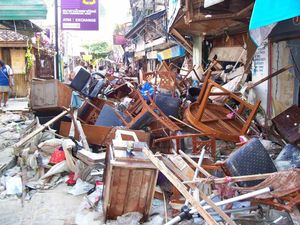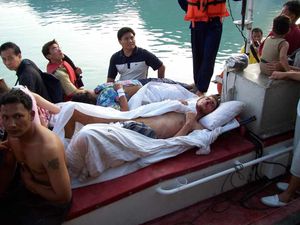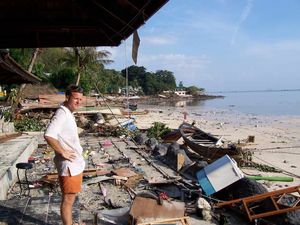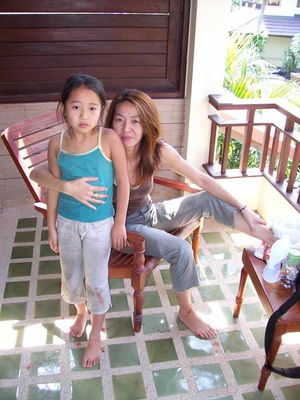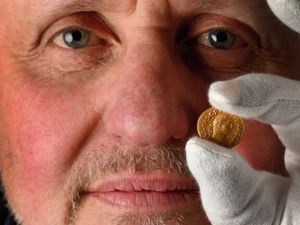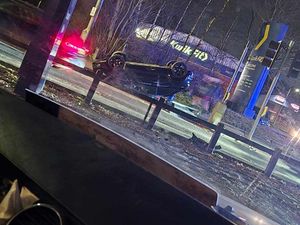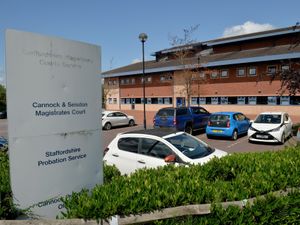Stourbridge policeman: I was so lucky to survive Boxing Day tsunami
Ten years later he still cannot quite believe how lucky he was.
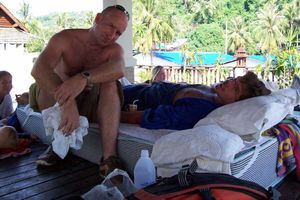
Less than five minutes after Inspector Ned Kelly and friend Nick Wood left the beach side restaurant where they had eaten breakfast it was destroyed by the Boxing Day Tsunami that devastated vast swathes of South East Asia leaving more than 150,000 people dead or missing and millions more homeless in 11 countries.
The police officer from Stourbridge - now aged 48 and Director of Investigative Training for the West Midland force - was on Koh Phi Phi, a tiny island off the Thailand mainland, when disaster struck.
He recalled: "We were leaving and went back to the hotel 100 metres away from the shore to collect our luggage intending to catch the 10am boat off the island. We had just reached our first floor room when we heard people shouting. There was something in the tone of the voices that made us go out onto the balcony to see what was happening.
"We over looked an alley way which was bone dry at first sight although people were jogging down it while looking back over their shoulder in the direction of the beach. Then water started to come down the path.
"At first it was just a trickle but within moments people were wading, then they were trying to swim, then they were being swept along by the fast flowing water. They were tossed into shop doorways and pushed under the water by the debris. They were drowning right in front of our eyes. It turned from nothing to a five feet deep surge in less than a minute."
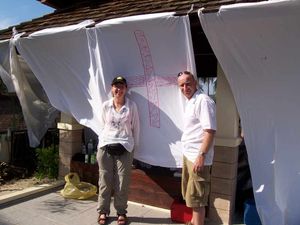
Nick, now 45, grabbed hold of the balcony rail and held one end of a belt as Inspector Kelly clung one handed onto the other while perched below a high voltage cable on a roof canopy trying to grab people as they floundered while carried along by the raging current.
Many of the dead and injured were bare foot and dressed in no more than swim wear when buffeted by corrugated iron roofs torn from buildings and other sharp edged debris.
Among the five people he hauled to safety were a couple called Alison and her partner Ugaz whom he first saw frantically clinging for dear life to a building opposite amid the rapidly rising water. There was also a Japanese mother and daughter whose names he never knew.
Within 15 minutes the water subsided as quickly as it had built up to reveal a scene of utter devastation. "It was horrific. There were people lying everywhere who were obviously dead while others were screaming and writhing about, clearly needing medical attention but the local pharmacy had been destroyed," recalled Inspector Kelly who used his mobile to phone a friend in England with news of the unfolding disaster. She contacted the Foreign Office and Reuters news agency.
Ned and Nick left the hotel to help the injured, among whom was a man from Manchester called Andy who had come on holiday with his fiancee to get married. Both had been washed out of their beach front bungalow through a glass door by the wall of water. He clung to his partner until she finally slipped from his grasp. Her body was discovered two weeks later.
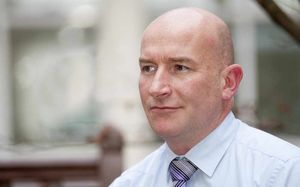
Ned's bedroom became a makeshift casualty clearing station. "The corrugated iron and other debris had sliced people up. They also had broken bones. I have only very limited medical training but we did what we could." Mattresses, water and fruit were gathered and taken to the roof where a gazebo was cloaked in white sheets, some scrawled with a red cross, so rescue planes would see where there were survivors. There was also rumours that a further, bigger wave - that never arrived - was expected within the hour and so the two men urged people to head for higher ground.
They did not follow their own advice because they had no way of moving the badly hurt under their makeshift care. Around 50 people were treated at the rooftop medical station. Among those who helped them was an optician from Edinburgh called Jill whose partner Alasdair(corr) was feared lost because he had been diving a mile out to sea when the Tsunami arrived. Miraculously he survived because the further away from land people had been, the better their chance of survival. The couple were reunited two days later and subsequently sold up to move permanently to live in Thailand.
Ned explained: "People were smiling despite the terrible situation because they were so pleased to be alive. There were also typical British moments of near farce. We had been working on the roof treating the casualties for some time when, suddenly, we all stopped and started shaking hands and introducing ourselves to one another. It was surreal."
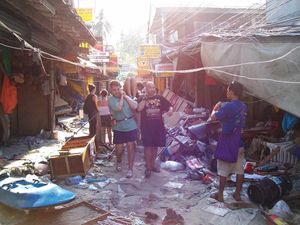
He and Nick realised they could be there for the long haul and took time out to scour the area at ground level for food and water to take back to the medical centre. Shop owners out on patrol with machetes took some persuading that they were not looters. Meanwhile their own bedroom was burgled.
There was no way they could get off the island because many boats had been wrecked and, even if they had found one that was seaworthy, they would not have known in which direction to head.
Helicopters started arriving the next day with doctors, nurses and medical equipment. They ferried the most seriously injured to hospital on the mainland while the remainder were treated at the scene.
Long lines of unhurt but traumatised holidaymakers waited for boats to take them away. It was another 24 hours before Ned and his friend got off the island.
He said: "I don't know exactly what happened in those few minutes after we left the beach moments before the Tsunami because I never met anybody who had been there when it hit who survived. We had regularly eaten breakfast there during our stay and had got to know some of the other regular customers. There were 20 or 30 of them sitting there enjoying themselves when we left and I never saw any of them again. That scene was replicated at other bars and restaurants all along the coast.
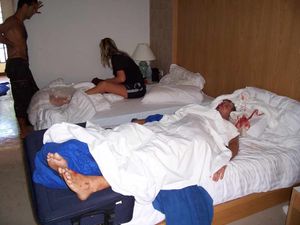
"It was incredible good fortune that it happened the only time we had been off ground level in a place of safety during the whole holiday. The rest of the time we were in the water or on the beach. It was fate. If you try and suggest anything other than that you struggle to explain how we survived and all the those others, especially the kids, perished."
He concluded: "I flew home on a Boeing 747 with hundreds of empty seats on it. There were only about 20 of us going home. I dreamt about what happened every night for two years. I was always on high ground trying to survive the Tsunami. It was a very unpleasant experience. Sometimes it felt as traumatic as the incident itself.
"I walked away from the Tsunami uninjured to continue my life. As a police officer I am used to dealing with death and injury. I got on with it but the lasting effect it had on me for the next two years helped me to understand what those who lost loved ones that dreadful day have had to go through and are probably still going through to this day."
